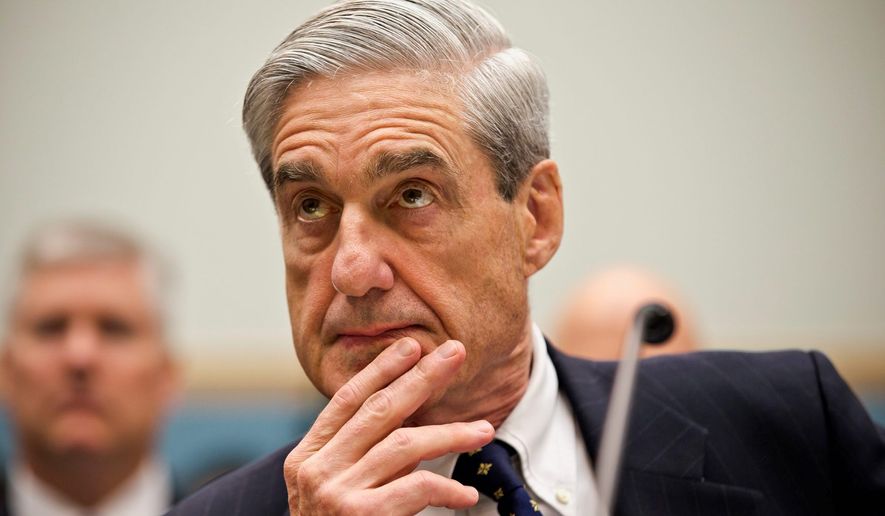OPINION:
There’s new news that Robert Mueller has expanded his investigation again into Whatever, and has empaneled a grand jury to indict someone once he and his team of expensive lawyers can find someone to indict.
He already has one grand jury at the ready in Alexandria, empaneled months ago to pursue Michael Flynn, the first national security adviser to the president, but that’s across the Potomac 10 miles away and the traffic in Washington is so fatiguing. Besides, the good restaurants are north of the river, and you can’t expect a $500-an-hour lawyer take lunch in a down-market restaurant without a white cloth on the table.
The new grand jury, which has been at work for weeks, is evidence that Mr. Mueller means business, or at least the business of handing out rich clients to lawyers who need one that can keep on giving for a long time. Mr. Mueller was originally charged with investigating whether the Russians tried to cook the 2016 presidential election with the collusion of Donald Trump or his campaign. Others have tried to find evidence of such wrongdoing, and so far as anyone knows they all failed. But hope springs eternal in the breasts of the good, the persistent and the piously partisan.
Empaneling a grand jury does not always mean very much, and sometimes it’s even a cover for a prosecutor, special or otherwise, who feels a need to demonstrate that he’s doing something, even when he’s not. President Trump says Mr. Mueller is on “a witch hunt,” and everyone agrees there’s no scarcity of witches haunting the swamp, but occasionally a special prosecutor — or “special counsel,” as we’re supposed to call him in our kinder, gentler day — actually finds an authentic witch riding a broom. For the record, the Russians say they aren’t among the witches.
Mr. Mueller sent off to Cheyenne for hired guns, and they’re trickling into town eager for a showdown. He has brought in 16 so far, disguised as lawyers, which ought to be more than a match for any gunfighter this side of Shane.
The president’s own special counsel, the impressively named Ty Cobb, says what he, too, is expected to say: “The White House favors anything that accelerates the conclusion of his work fairly. The White House is committed to fully co-operating with Mr. Mueller.”
Grand juries have the fearsome reputation of having the power to indict anyone, even the celebrated ham sandwich, but indictment and conviction are not one and the same. Trial and conviction are the work of petit juries, the kind that Perry Mason tied into knots. But grand juries have the further power of making targets, even presidents, miserable and distracted even if they are never asked to return an indictment.
But Mr. Mueller is expected to do more than distract Mr. Trump and make his life miserable. He’s expected, as Lyndon B. Johnson famously said, “to nail that coonskin to the wall.” The president’s critics, set to salivating with each nothingburger, keep imagining the taste of sirloin.
Maybe the new grand jury will deliver. “This is yet a further sign that there is a long term, large-scale series of prosecutions being contemplated and being pursued by the special counsel,” Stephen Vladeck, a law professor at the University of Texas, tells The Wall Street Journal. “If there was already a grand jury in Alexandria looking at [Mr.] Flynn, there would be no need to reinvent the wheel for the same guy. This suggests that the investigation is bigger and wider than [Mr.] Flynn, perhaps substantially so.”
Or maybe not. Thomas Zeno, a federal prosecutor for three decades before acquiring a position at the well-connected Washington law firm Squire Patton Boggs, tells the Journal that the new grand jury is obviously conducting a “very vigorous” investigation, but “this doesn’t mean [Mr. Mueller] is going to bring charges. But it shows that he is very serious. He wouldn’t do this if it were winding down.”
There’s little winding-down risk. An ambitious special counsel can keep a client paying out for years, and the U.S. government is the best client of all because it’s a bottomless pit of cash, easy for the plucking. He has only to worry that the president could do a Comey on him. Sacking a special prosecutor, or counsel, might be suicide for a president, but Donald Trump is unpredictable. His base of true believers, shrinking or not, is still considerably larger than the base of any other politician now in sight.
Mr. Mueller is taking no chances. He has repaired to an undisclosed location, perhaps the one used by Dick Cheney when he was the vice president. He’s girded for the long march.
• Wesley Pruden is editor in chief emeritus of The Times.




Please read our comment policy before commenting.